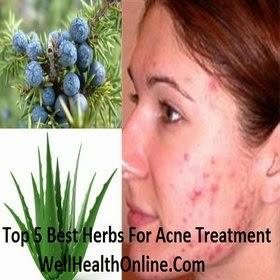Best Herbs for Acne1. Tea treeAlso known as Australian tea tree or tea tree oil, the part used for fighting acne is the oil that is obtained from the leaves. Tea tree is not to be confused with the mildly stimulating beverage known as tea.Tea tree (melaleuca alternifolia) is native to Australia where it is usually found in swampy habitats. Sometimes known as the "wonder from down under," tea tree oil is obtained by crushing tea tree leaves. Tea tree oil is a powerful antiseptic that contains many compounds that can prevent the growth of certain infection causing fungi and bacteria.Its powerful antiseptic properties is the reason that tea tree oil is used to treat many conditions besides acne such as;· Yeast infections including vaginal yeast infection because it is able to disrupt the activity of fungus (candida albicans) that causes these infections.
· Wounds benefit from the application of tea tree oil because this oil has been shown to kill the many microorganisms that lead to infections including the type of bacteria that may be resistant to antibiotics.
· Fungal toenail infections can also be treated with tea tree oil.
· Athlete's foot can also be treated by this essential oil.Other conditions that can be effectively treated with tea tree oil include various other fungal or bacterial skin infections, dandruff, gingivitis, insect bites and stings, etc.Tea tree oil for acne treatment has been found to be just as effective but without the side effects of OTC 5 percent benzoyl peroxide. Although the latter worked faster in some studies, both were found to be effective by the end of the studies. This is the reason that tea tree oil is believed to be one of the best herbs for acne.To useWhen using tea tree oil for natural acne treatment, you can soak a cotton ball or swab with 100 percent tea tree essential oil and apply to the blemishes. There are also many commercial formulations that include tea tree oil as an ingredient so simply follow the manufacturer's directions on use.PrecautionsTea tree oil is only to be used externally. Do not ingest it as it is toxic and can be fatal. If you have sensitive skin, you may want to dilute the essential oil in a carrier oil such as skin friendly oils like jojoba, sweet almond oil, apricot kernel oil, etc.2. AloeAnother of the best herbs for acne natural treatment is aloe (aloe vera) which has played a key role in natural healing besides acne since the dawn of time and unlike tea tree oil, it can be used internally and externally. Some conditions for which aloe is commonly used include;· Wounds (including sunburn, burns, scrapes, etc) benefit from the application of aloe because it contains compounds that reduce inflammation, swelling as well as redness in addition to helping relieve itching and pain.
· Psoriasis flare-ups and eczema can be relieved with aloe.
· Diabetes can benefit from ingesting aloe juice because it helps to reduce blood sugar levels.
· Infections can be treated or prevented with the application of aloe.Aloe is also an immune system booster and is usually recommended for general skin care because it contains certain skin enhancing properties which is why it is one of the best herbs used to cure acne as well as reduce acne scars.To useThe aloe juice or gel can be used which you can purchase from a health food store to get the best and purest quality. You can also cut an aloe leaf and slice it lengthwise and scoop out the gel and apply to freshly washed skin. It does not need to be washed off. You can use it as a toner or as a moisturizer.PrecautionsAloe is generally very safe and can be used by anyone unless you are allergic to this plant. It can also have very mild laxative effects unless you use the latex form of aloe which is a strong laxative so you may want to avoid this latex form of aloe.3. GuggulGuggul is an herb that is popular in Indian Ayurveda medicine and has been found to be antibacterial, antiseptic, anti-inflammatory and immune boosting.Guggul is a resin that is produced by the mukul myrrh tree and is a traditional Indian remedy that is commonly used to treat various skin disorders, urinary problems, joint pain, etc.Although there are limited studies on the effectiveness of guggul for acne treatment, one important study showed that this herb was just as effective for the treatment of cystic acne on the face, chest and back as the prescription drug tetracycline.To useGuggul is available in supplement form and the general recommended dose is 50 milligrams of guggulsterones (active ingredients in guggul) per day.PrecautionsGuggul may cause vomiting, headaches, diarrhea, etc, in some people and if you are taking any other medications at the same time, it may interfere with their action so if you are on any medication, consult your doctor before taking guggul.4. JuniperAnother of the herbs used in treatment of acne is juniper of which the berries or branches are used.Juniper is a popular diuretic that is commonly used because of this for high blood pressure, congestive heart failure, PMS as well as other women's health issues. It is also an anti-inflammatory making it useful for natural arthritis treatment and have shown some benefits for being able to reduce blood sugar levels.It is recommended for natural acne treatment because it contains antibacterial, anti-inflammatory and astringent properties. It also contains alpha hydroxyl acids (AHAs) which are skin exfoliating which can help eliminate acne scars.To useAn infusion can be made from this herb that can be used as a skin wash for acne prone skin. The oil from juniper berries can also be applied directly on the skin.5. CalendulaCalendula officinalis also known as pot marigold is different from the very common garden marigold. Calendula flowers do not have a scent and are edible unlike the garden marigold.Calendula is commonly recommended to heal various internal and external ailments such as eczema, hemorrhoids, cuts and burns, athlete's foot, varicose veins, to improve digestion, heal certain ulcers, etc.Calendula is used to treat acne and many other skin conditions because of its anti-inflammatory and antibacterial properties. It is also antifungal, antibiotic and antiseptic.Calendula contains more than 30 chemical compounds including salicylic acid. The yellow and orange colors of the flowers point towards the flavonoids and carotenoids that they contain which help with skin regeneration as well as promoting good eyesight.To useThere are many products on the market that incorporate calendula that you can use 3 to 4 times daily.You can also make an infusion with calendula flowers to use as a compress or poultice. An infusion can also be used as a natural toner.Precautions
While this herb is generally safe and can be used by most people without any issues, avoid it if you are allergic to this family of plants.By Tracy Rhames


